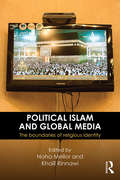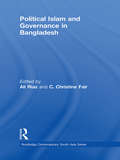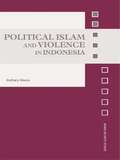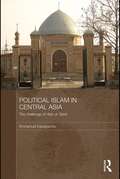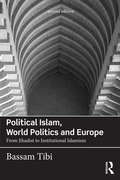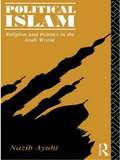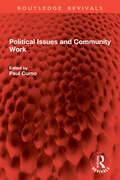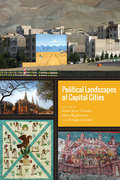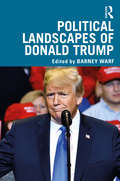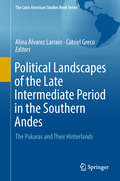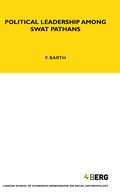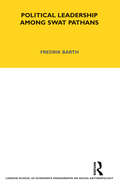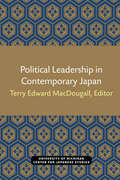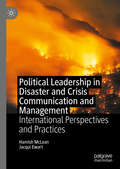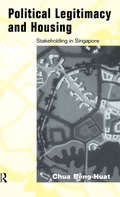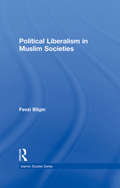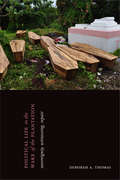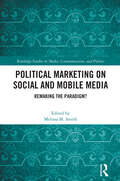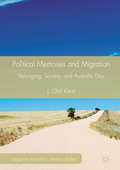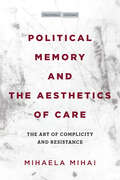- Table View
- List View
Political Islam and Global Media: The boundaries of religious identity
by Noha Mellor Khalil RinnawiThe development of new and social networking sites, as well as the growth of transnational Arab television, has triggered a debate about the rise in transnational political and religious identification, as individuals and groups negotiate this new triad of media, religion and culture. This book examines the implications of new media on the rise of political Islam and on Islamic religious identity in the Arab Middle East and North Africa, as well as among Muslim Arab Diasporas. Undoubtedly, the process of globalization, especially in the field of media and ICTs, challenges the cultural and religious systems, particularly in terms of identity formation. Across the world, Arab Muslims have embraced new media not only as a source of information but also as a source of guidance and fatwas, thereby transforming Muslim practices and rituals. This volume brings together chapters from a range of specialists working in the field, presenting a variety of case studies on new media, identity formation and political Islam in Muslim communities both within and beyond the MENA region. Offering new insight into the influence of media exposure on national, political, and cultural boundaries of the Islamic identity, this book is a valuable resource for students and scholars of Middle Eastern politics, specifically political Islam and political communication.
Political Islam and Governance in Bangladesh (Routledge Contemporary South Asia Series)
by Ali RiazThe past decade has seen a marked policy focus upon Bangladesh, home to nearly 150 million Muslims; it has attracted the attention of the world due to weak governance and the rising tide of Islamist violence. This book provides a broad-ranging analysis of the growth and impact of "political Islam" in Bangladesh, and reactions to it. Grounded in empirical data, experts on Bangladesh examine the changing character of Bangladeshi politics since 1971, with a particular focus on the convergence of governance, Islamism and militancy. They examine the impacts of Islamist politics on education, popular culture and civil society, and the regional and extraregional connections of the Bangladeshi Islamist groups. Bringing together journalists and academics - all of whom have different professional and methodological backgrounds and field experiences which impact upon these issues from different vantage points - the book assesses Bangladesh’s own prospects for internal stability as well as its wider impact upon South Asian security. It argues that the political environment of Bangladesh, the appeal of Islamist ideology to the general masses and the dynamic adaptability of Islamist organizations all demonstrate that Bangladesh will continue to focus the attention of policy makers and analysts alike. This is a timely, incisive and original explanation of the rise of political Islam and Islamic militancy in Bangladesh.
Political Islam and Violence in Indonesia (Asian Security Studies)
by Zachary AbuzaPolitical Islam and Violence in Indonesia presents a penetrating new investigation of religious radicalism in the largest Muslim country in the world. Indonesia is a country long known for its diversity and tolerant brand of Islam. However, since the fall of Suharto, a more intolerant form of Islam has been growing, one whose adherents have carried out terrorist attacks, waged sectarian war, and voiced strident anti-Western rhetoric. Zachary Abuza’s unique analysis of radical Islam draws upon primary documents such as Jemaah Islamiyah’s operations manual, interviews, and recorded testimonies of politicians, religious figures, and known militants, as well as personal interviews with numerous security and intelligence experts in Indonesia and elsewhere, to paint a picture at once guardedly optimistic about the future of Indonesian democracy and concerned about the increasing role of conservative and radical Islam in Indonesian society. This book will be of great interest to students of Indonesian politics, Asian studies, political violence and security studies in general.
Political Islam in Central Asia: The challenge of Hizb ut-Tahrir (Central Asian Studies #Vol. 21)
by Emmanuel KaragiannisThe terrorist attacks in the United States on 9/11 and the U.S.-led military campaign against the Taliban regime in Afghanistan have intensified scrutiny of radical Islamic groups across Central Asia. This books offers one of the first comprehensive studies of the activities of one of the most feared - but least understood - inernational Islamist organizations in post-Soviet Central Asia: Hizb ut-Tahrir, that is The Party of Islamic Liberation. By utilizing social movement theory, the book analyses political Islam in Central Asia in general, and the phenomenon of Hizb ut-Tahrir in particular. It reveals the critical role of its ideology (based on a selective interpretation of Islamic theology and history) in the party’s recruiting success. Using primary sources, including the group’s publications and documents, official reports, alongside interviews with scholars, security experts, mullahs, journalists, diplomats, government officials and group members, it covers the rise of political Islam in the post-Soviet Central Asia, alongside the origins and current status of Hizb ut-Tahrir - its leadership, ideology, political methodology and party structure and its rise in the region from Kazakhstan to Russia and China. Although the organization has received less international examination partly because it has advocated a non-violent approach toward its goals, this book sketches its prospective future relationship to violence in this key region.
Political Islam, Iran, and the Enlightenment
by Ali MirsepassiAli Mirsepassi's book presents a powerful challenge to the dominant media and scholarly construction of radical Islamist politics, and their anti-Western ideology, as a purely Islamic phenomenon derived from insular, traditional, and monolithic religious "foundations. " It argues that the discourse of political Islam has strong connections to important and disturbing currents in Western philosophy and modern Western intellectual trends. The work demonstrates this by establishing links between important contemporary Iranian intellectuals and the central influence of Martin Heidegger's philosophy. We are also introduced to new democratic narratives of modernity linked to diverse intellectual trends in the West and in non-Western societies, notably in India, where the ideas of John Dewey have influenced important democratic social movements. As the first book to make such connections, it promises to be an important contribution to the field and will do much to overturn some long-held and pervasive assumptions about the dichotomy between East and West.
Political Islam, World Politics and Europe: From Jihadist to Institutional Islamism
by Bassam TibiThe new and updated edition of Political Islam, World Politics and Europe focusses on the shift within political Islam, in light of 9/11 and the events of the Arab Spring, from a jihadist struggle, to institutional Islamism. Refuting what has often been referred to by commentators as the ‘moderation,’ of Islamism, the second edition of this book introduces the concept of ‘institutional,’ Islamism, a process which Tibi argues was accelerated in the aftermath of the Arab Spring. Both jihadist and institutional Islamism pursue the same goal of an Islamist state, but disagree fundamentally on the strategy for achieving it. Whilst jihadism is committed to the idea of a (violent) Islamic world revolution, institutional Islamism embraces political institutions as a means to an end. Turning to the events of the Arab Spring in Tunisia, Libya and Egypt this book attempts to determine whether an abandonment of violence is enough to underpin a shift to genuine democracy. Analysing the fall of Morsi in particular, Tibi questions what lessons can be learnt from his presidency, and argues that this event will not change the overall trend of development from jihadism to institutional Islamism A timely addition to existing literature, this book will be of interest to students and scholars studying Middle Eastern and European Politics, Political Islam and International Relations.
Political Islam: Religion and Politics in the Arab World
by Nazih AyubiIslamic theocracy is now firmly established in fundamentalist Iran, and waves of fundamentalism are sweeping the entire Islamic world, and its diaspora.This book examines the claim of those Islamists who contend that, as a belief system and a way of life, Islam carries with it a theory of politics and the state which should be applied unquestioningly. Ayubi traces both the intellectual sources and the socio-economic bases of Political Islam, arguing that it is a modern phenomenon, dating back only to the inter-war period. He describes its major proponents as urban, educated and relatively young people, whose energies were mobilised, but whose expectations were not fulfilled by the post-independence `populist' regimes in the Arab World.Islamic movements in six countries are studied in detail. Ayubi's distinctively broad definition of politics encompasses innovative material on sex and the family, and on the emerging alternative economic and social networks of Islamic banks, schools, and hospitals in the countries discussed.Ayubi stresses the traditional concern in Islam for the collective enforcement of morals, but argues that there is no case for the commonly held misconception that politics begins from theological principles in the Arab world: the historical connection between Islam and politics can be explained as an attempt by the rulers to legitimise their actions. He suggests that radical Islamists are reversing this position by subjecting politics to their specific religious views, so their movement is in some senses an anti-state one. He concludes by discussing possible intellectual responses to fundamentalism, drawing on the thinking of contemporary Muslim liberals.
Political Issues and Community Work (Routledge Revivals)
by Paul CurnoOriginally published in 1978 this book was compiled with practitioners in mind. It clarifies the implications of significant political theories and issues of the 20th Century which affected their work. Drawing on case studies from their own experience, the contributors underline the political variables facing the community worker, whatever the context. Examples are from the local neighbourhood, from inside and outside the local authority, and – dramatically illustrating the ideological, practical and political dilemmas faced in some form by most community groups – from a picture of community action in Northern Ireland. The final section considers two growing strands in community work – the importance attached to developing knowledge and technical competence, and the increasing emphasis being given to making alliances with other relevant groups and organisations.
Political Journalism in Comparative Perspective
by Erik Albæk Arjen van Dalen Nael Jebril Claes H. de Vreese Erik Albæk Arjen Van Dalen Nael Jebril Claes H. de VreesePolitical journalism is often under fire. Conventional wisdom and much scholarly research suggest that journalists are cynics and political pundits. Political news is void of substance and overly focused on strategy and persons. Citizens do not learn from the news, are politically cynical, and are dissatisfied with the media. This book challenges these assumptions, which are often based on single-country studies with limited empirical observations about the relation between news production, content, and journalism's effects. Based on interviews with journalists, a systematic content analysis of political news, and panel survey data in different countries, this book tests how different systems and media-politics relations condition the contents of political news. It shows how different content creates different effects, and demonstrates that under the right circumstances citizens learn from political news, do not become cynical, and are satisfied with political journalism.
Political Landscapes of Capital Cities
by Jessica Joyce Christie Jelena Bogdanović Eulogio GuzmánPolitical Landscapes of Capital Cities investigates the processes of transformation of the natural landscape into the culturally constructed and ideologically defined political environments of capital cities. In this spatially inclusive, socially dynamic interpretation, an interdisciplinary group of authors including archaeologists, anthropologists, and art historians uses the methodology put forth in Adam T. Smith’s The Political Landscape: Constellations of Authority in Early Complex Polities to expose the intimate associations between human-made environments and the natural landscape that accommodate the sociopolitical needs of governmental authority. Political Landscapes of Capital Cities blends the historical, political, and cultural narratives of capital cities such as Bangkok, Cusco, Rome, and Tehran with a careful visual analysis, hinging on the methodological tools of not only architectural and urban design but also cultural, historiographical, and anthropological studies. The collection provides further ways to conceive of how processes of urbanization, monumentalization, ritualization, naturalization, and unification affected capitals differently without losing grasp of local distinctive architectural and spatial features. The essays also articulate the many complex political and ideological agendas of a diverse set of sovereign entities that planned, constructed, displayed, and performed their societal ideals in the spaces of their capitals, ultimately confirming that political authority is profoundly spatial. Contributors: Jelena Bogdanović, Jessica Joyce Christie, Talinn Grigor, Eulogio Guzmán, Gregor Kalas, Stephanie Pilat, Melody Rod-ari, Anne Parmly Toxey, Alexei Vranich
Political Landscapes of Donald Trump
by Barney WarfThis book delves into the life and work of President Donald Trump, who is arguably the most famous and controversial person in the world today. While his administration has received enormous attention, few have studied the spatial dimensions of his policies. Political Landscapes of Donald Trump explores the geographies of Trump from multiple conceptual standpoints. It contextualizes Donald and his rise to power within the geography of his victory in 2016. Several essays in the book are concerned with his white ethno-nationalist political platform and social bases of support. Others focus on Trump’s use of Twitter, his ties to professional wrestling, and his innumerable lies and deceits. Yet another set delves into the geopolitics of his foreign policies, notably in Cuba, Korea, the Middle East, and China. Finally, it covers how his administration has addressed – or failed to address – climate change and its treatment of undocumented immigrants. This book will be of interest to anyone interested in the Trump administration, as well as social scientists and the informed lay public.
Political Landscapes of the Late Intermediate Period in the Southern Andes: The Pukaras And Their Hinterlands (The Latin American Studies Book Series)
by Alina Álvarez Larrain Catriel GrecoThis book studies the relationship between pukaras and their surrounding landscape, focusing on the architectural and settlement variability registered in both contexts. It is the outcome of a symposium held at the XIX National Congress of Argentine Archaeology (San Miguel de Tucuman, August 8–12, 2016) entitled, "Pukaras, strategic settlements and dispersed settlements: Political landscapes of the Late Intermediate Period in the Southern Andes." Based on the topics discussed at the event, this book presents nine case studies covering a large geographic area within the Southern Andes (northwestern Argentina, northern Chile and southern Bolivia), and breaking the national barriers that tend to atomize pre-Hispanic landscapes.The respective chapters cover a wide range of themes: from architectural and settlement variability, ways to build and inhabit space, social segmentation and hierarchy; to endemic conflict, analysis of accessibility and visibility, spatiality and temporality of landscapes; as well as new dating. This book goes beyond the Late Intermediate Period (LIP) analyses from the perspective of fortified settlements and material evidence related to war, by placing the focus on how ancient political landscapes were constructed from the relation between the pukaras and other sites as part of the same territory.The methodologies used include pedestrian surveys, photogrammetric surveys with UAVs (unmanned aerial vehicles) or drones, topographic and architectural surveys, excavations of households, ceramic and rock art analysis, and spatial analysis with geographic information systems (GISs). Given the numerous thematic interconnections between the contributions, the Editors have organized the chapters geographically, moving from south to north: from the southern valleys of Catamarca Province in Argentina to Lipez in the southern part of the Bolivian Altiplano, passing through the Calchaqui valleys of Catamarca, the puna and Quebrada de Humahuaca of Jujuy in northwest Argentina and the Antofagasta region in northern Chile.The book provides valuable new theoretical and methodological perspectives on the study of political landscapes of the Late Intermediate Period in the Southern Andes .
Political Leadership Among Swat Pathans
by Frederik Barth"THE MAIN PURPOSE of the present study is to give a descriptive analysis of the political system of Swat, with special reference to the sources of political authority, and the form of organization within which this authority is exercised." (Barth, 1)
Political Leadership Among Swat Pathans: Volume 19 (London School Of Economics Monographs On Social Anthropology Ser. #No. 19)
by Fredrik BarthA classic and highly influential ethnography, which explores political leadership among Swat Pathans - and which emphasizes the importance of individual decision-making for wider social processes. This study describes certain aspects of the society of the Pathans of the Swat valley in the North-West Frontier Province of Pakistan. Except where other reference is given, the material on which it is based was collected by the author in the period February-November 1954.
Political Leadership in Contemporary Japan (Michigan Papers in Japanese Studies #1)
by Terry Edward MacDougallPolitical Leadership in Contemporary Japan
Political Leadership in Disaster and Crisis Communication and Management: International Perspectives and Practices
by Jacqui Ewart Hamish McLeanThis book explores the role of elected leaders in disaster management. Filling a significant gap in disaster literature, the authors take a pragmatic approach to the relationships between the public under threat, the operational response, and the interests and actions of elected officials. Key tactics are explored, from the ways operational managers strategically deal with unreasonable political demands to what disaster officials argue is the responsibility of elected officials at all levels of government – that is, to ensure vital life-saving information reaches the people who need it most. The book draws on case studies such as the mismanagement of public perceptions by President George W. Bush during Hurricane Katrina in the United States and the widely acclaimed, heartfelt messages delivered by Queensland Premier Anna Bligh during the 2010–11 South-East Queensland floods in Australia. Drawing on a series of interviews with senior disaster managers in ten countries, this book is highly relevant for students, scholars and practitioners interested in disaster communication.
Political Legitimacy and Housing: Singapore's Stakeholder Society
by Beng-Huat ChuaSingapore's successful public housing programme is a source of political legitimacy for the ruling People's Action Party. Beng-Huat Chua accounts for the success of public housing in Singapore and draws out lessons for other nations. Housing in Singapore, he explains in this incisive analysis, is seen neither as a consumer good (as in the US) nor as a social right (as in the social democracies of Europe). The author goes on to look at the ways in which Singapore's planners have dealt with the problems of creating communities in a modern urban environment. He concludes that the success of the public housing programme has done much for Singapore.
Political Liberalism in Muslim Societies (Routledge Islamic Studies Series)
by Fevzi BilginHaving survived the process of modernization and reasserted themselves in public life, religious traditions play an increasingly important public role in shaping and defining social institutions and interactions. This book examines Rawls’s theory of political liberalism in the context of Muslim societies, where religion wields a significant social and political influence. Contrasting a sociological analysis with a theoretical approach, the author explores the political questions brought up by religious individuals, organizations, and minorities, and examines fundamental notions such as neutrality of state, public/private distinction, and individual autonomy. Offering a rich set of conceptual and normative instruments, the author presents new ways to incorporate political liberalism into political discourses and advocating policy prescriptions for the advancement of democracy in Muslim societies. Independent of the focus on Muslim societies, this book makes a significant contribution to the political liberalism debate. As such, it will be of interest not only to students of Islam and the Middle East, but also to those with an interest in political philosophy, democracy, religion and contemporary political theory.
Political Life in the Wake of the Plantation: Sovereignty, Witnessing, Repair
by Deborah A. ThomasIn 2010, Jamaican police and military forces entered the West Kingston community of Tivoli Gardens to apprehend Christopher &“Dudus&” Coke, who had been ordered for extradition to the United States on gun and drug-running charges. By the time Coke was detained, somewhere between seventy-five and two hundred civilians had been killed. In Political Life in the Wake of the Plantation, Deborah A. Thomas uses the incursion as a point of departure for theorizing the roots of contemporary state violence in Jamaica and in post-plantation societies in general. Drawing on visual, oral historical, and colonial archives, Thomas traces the long-term legacies of the plantation system and how its governing logics continue to shape and replicate forms of violence. She places affect at the center of sovereignty to destabilize disembodied narratives of liberalism and progress and to raise questions about recognition, repair, and accountability. In tying theories of politics, colonialism, race, and affect together with Jamaica's history, Thomas presents a robust framework for understanding what it means to be human in the plantation's wake.
Political Marketing and Management in the 2017 New Zealand Election (Palgrave Studies in Political Marketing and Management)
by Jennifer Lees-MarshmentThis book reveals the market research, strategy, branding and communication behind the unpredictable 2017 New Zealand election result which saw Jacinda Ardern elected Labour leader just 8 weeks before the election to become Prime Minister. Utilising rich data sources that include a 250,000 Vote Compass survey and interviews with key political advisors, it explores the alignment of the policy of National, Labour, the Greens and NZ First with party supporters, demographic segments and undecided voters. It also analyses the leadership communication and branding of the leaders Bill English, Jacinda Ardern and Andrew Little, as well as the advertising by minor parties ACT, the Greens, United Future and the Maori Party. The book provides advice for practitioners, such as: focus on being responsive, communicate delivery competence, differentiate in policy and advertising, build an energetic and charismatic leader brand and be flexible when planning.
Political Marketing on Social and Mobile Media: Remaking the Paradigm? (Routledge Studies in Media, Communication, and Politics)
by Melissa M. SmithThis book explores how social and mobile media have been used in political campaigns since 2008, examining how social media are already being implemented as well as how these types of messaging platforms might be used in the future.Chapters in this book discuss how social and mobile media are becoming imperative when marketing a candidate’s image, distributing messages, fundraising, and getting out the vote. While some chapters delve into a particular candidate’s campaign, others discuss several campaigns in light of a particular political objective. Authors also discuss the use of political messaging and its possible role in political polarization through misinformation and interference. In particular, the book seeks to demonstrate a greater reliance on social and mobile media for political messaging, thus ushering in a possible new marketing paradigm.This book will interest researchers and students in the areas of political communication, political science, government, public affairs, and social and digital media.
Political Matter: Technoscience, Democracy, and Public Life
by Jane Bennett Isabelle StengersTaking seriously the argument that things have politics, Political Matter seeks to develop a fully materialist theory of politics, one that opens new possibilities for imagining the relationship between scientific and political practices. The contributors assert that without such a theory the profusion of complex materials with and through which we live-plastic bags, smart cars, and long-life lightbulbs, for example-too often leaves us oscillating between fearful repudiation and glib celebration.Exploring the frictions that come from linking the work of scholars in science and technology studies and political theory, these essays spark new ways of understanding the matter of politics.Contributors: Andrew Barry, U of Oxford; Jane Bennett, Johns Hopkins U; Stephen J. Collier, New School; William E. Connolly, Johns Hopkins U; Rosalyn Diprose, U of New South Wales; Lisa Disch, U of Michigan; Gay Hawkins, U of New South Wales; Andrew Lakoff, UC San Diego; Noortje Marres, U of London; Isabelle Stengers, U Libre de Bruxelles; Nigel Thrift, U of Warwick.
Political Memories and Migration
by J. Olaf KleistThis book explores the relationship between political memories of migration and the politics of migration, following over two hundred years of commemorating Australia Day. References to Europeans' original migration to the continent have been engaged in social and political conflicts to define who should belong to Australian society, who should gain access, and based on what criteria. These political memories were instrumental in negotiating inherent conflicts in the formation of the Australian Commonwealth from settler colonies to an immigrant society. By the second half of the twentieth century, the Commonwealth employed Australia Day commemorations specifically to incorporate new arrivals, promoting at first citizenship and, later on, multiculturalism. The commemoration has been contested throughout its history based on two distinct forms of political memories providing conflicting modes of civic and communal belonging to Australian politics and policies of migration. Introducing the concept of Political Memories, this book offers a novel understanding of the social and political role of memories, not only in regard to migration.
Political Memories and Migration: Belonging, Society, and Australia Day (Palgrave Macmillan Memory Studies)
by J. Olaf KleistThis book explores the relationship between political memories of migration and the politics of migration, following over two hundred years of commemorating Australia Day. References to Europeans’ original migration to the continent have been engaged in social and political conflicts to define who should belong to Australian society, who should gain access, and based on what criteria. These political memories were instrumental in negotiating inherent conflicts in the formation of the Australian Commonwealth from settler colonies to an immigrant society. By the second half of the twentieth century, the Commonwealth employed Australia Day commemorations specifically to incorporate new arrivals, promoting at first citizenship and, later on, multiculturalism. The commemoration has been contested throughout its history based on two distinct forms of political memories providing conflicting modes of civic and communal belonging to Australian politics and policies of migration. Introducing the concept of Political Memories, this book offers a novel understanding of the social and political role of memories, not only in regard to migration.
Political Memory and the Aesthetics of Care: The Art of Complicity and Resistance (Cultural Memory in the Present)
by Mihaela MihaiWith this nuanced and interdisciplinary work, political theorist Mihaela Mihai tackles several interrelated questions: How do societies remember histories of systemic violence? Who is excluded from such histories' cast of characters? And what are the political costs of selective remembering in the present? Building on insights from political theory, social epistemology, and feminist and critical race theory, Mihai argues that a double erasure often structures hegemonic narratives of complex violence: of widespread, heterogeneous complicity and of "impure" resistances, not easily subsumed to exceptionalist heroic models. In dialogue with care ethicists and philosophers of art, she then suggests that such narrative reductionism can be disrupted aesthetically through practices of "mnemonic care," that is, through the hermeneutical labor that critical artists deliver—thematically and formally—within communities' space of meaning. Empirically, the book examines both consecrated and marginalized artists who tackled the memory of Vichy France, communist Romania, and apartheid South Africa. Despite their specificities, these contexts present us with an opportunity to analyze similar mnemonic dynamics and to recognize the political impact of dissenting artistic production. Crossing disciplinary boundaries, the book intervenes in debates over collective responsibility, historical injustice, and the aesthetics of violence within political theory, memory studies, social epistemology, and transitional justice.
